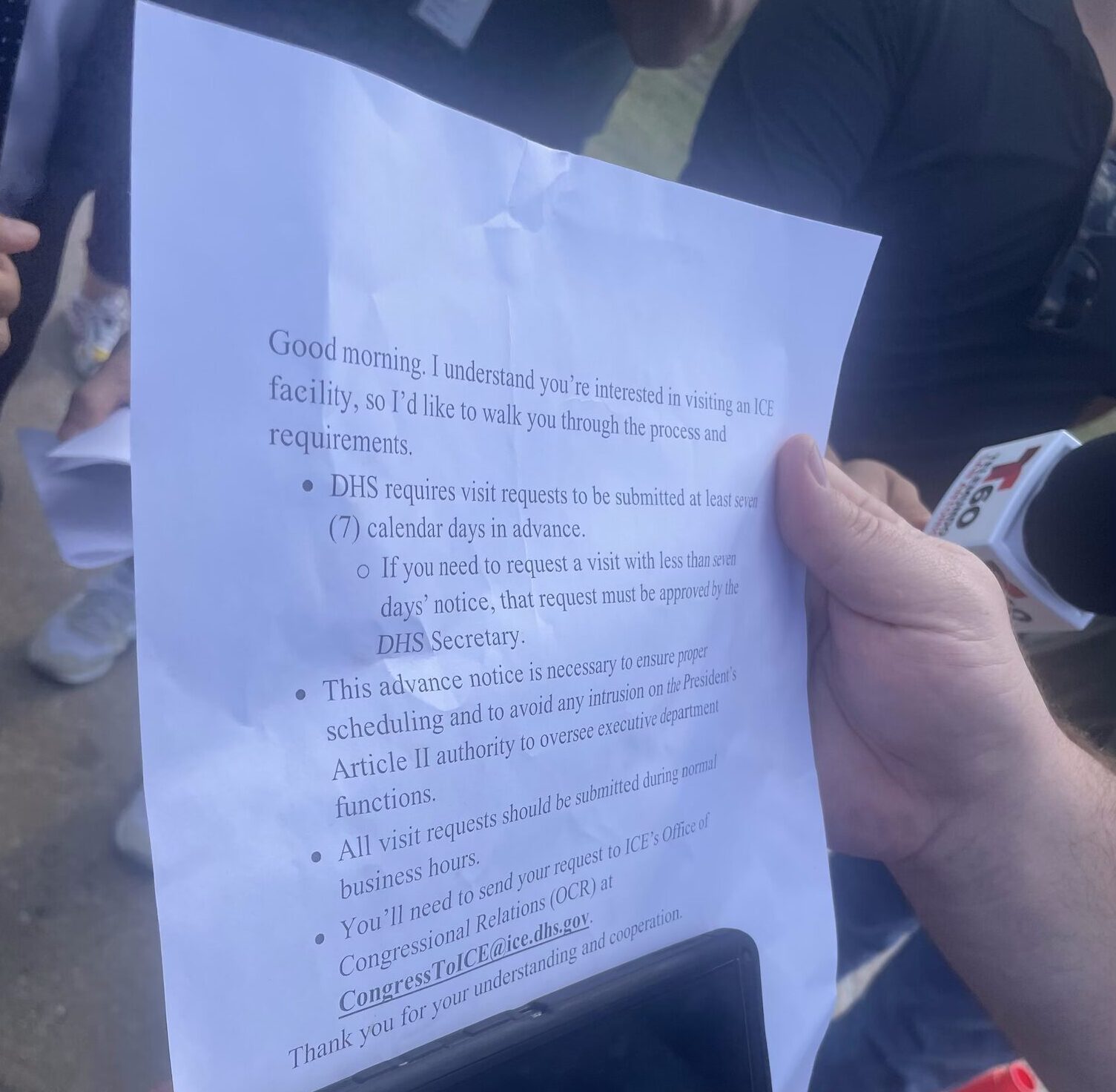News from the South - Texas News Feed
'In the dark': Bills tracking impact of Texas’ truancy courts on kids not likely to pass
SUMMARY: The Austin Independent School District revealed a sharp drop in truancy court referrals this school year, from 364 to 69, after reforming its prevention process. Despite thousands of Texas students being sent to truancy court annually, no state agency tracks detailed referral or outcome data. KXAN’s investigation highlighted this lack, prompting stalled legislation to create a uniform statewide truancy tracking system. Other bills propose changes like modified prevention measures and mandatory school attendance policies with parent notifications and home visits. Advocates note that without comprehensive tracking, Texas remains “in the dark” about truancy outcomes and the effectiveness of interventions.
The post 'In the dark': Bills tracking impact of Texas’ truancy courts on kids not likely to pass appeared first on www.kxan.com
News from the South - Texas News Feed
Texas House Republicans vote against retroactive punishments for quorum breakers
SUMMARY: A week after Texas House Democrats fled to block Republicans’ redistricting vote on the “Big, Beautiful Map,” Republicans are pushing bills to punish or prevent future quorum breaks. Proposed measures include banning fundraising during quorum breaks, vacating seats after seven unexcused absences, and lowering the quorum threshold from two-thirds to a simple majority. While Republicans support these bills, they failed to censure the Democrats. Democrats face fines exceeding $9,000 each for their absence, including costs for Texas DPS efforts to return them. Additionally, a Senate proposal aims to ban fundraising during special sessions to deter quorum breaks and save taxpayer money.
Read the full article
The post Texas House Republicans vote against retroactive punishments for quorum breakers appeared first on www.kxan.com
News from the South - Texas News Feed
Dems in Congress Are Being Denied Access to ICE Facilities. Now They’re Suing.
At least a dozen Democratic members of Congress have been denied entry to federal immigration facilities this year when they showed up to conduct oversight as President Donald Trump has ramped up his mass deportation efforts. Now, they are suing the Trump administration.
The lawsuit was filed in the federal district court for the District of Columbia on July 30 by 12 Democrats from the House of Representatives, including El Paso Congresswoman Veronica Escobar, who has provided oversight of such facilities for several years.
“As part of its campaign of mass deportation, the Trump-Vance administration has stretched the U.S. immigration detention system far beyond its capacity. More people are being held by the United States in immigration detention than ever before, with many facilities housing more individuals than they were built to contain,” the lawsuit states. “Reports of mistreatment have been widespread and have included disturbing details of overcrowding, food shortages, lack of adequate medical care, and unsanitary conditions.”
Since 2019, Congress has adopted statutory provisions stating that the Department of Homeland Security (DHS) may not use federal funds may to prevent members “from entering, for the purpose of conducting oversight, any facility operated by or for the Department of Homeland Security used to detain or otherwise house” noncitizens, per the lawsuit. Those mandates for unfettered oversight were a direct response to Trump’s attempts to block members of Congress under his first administration.
However, since June, several members of Congress have been turned away when attempting to enter and examine federal immigration facilities, including privately run detention centers and ICE field offices where immigrants have been detained.
Escobar currently serves on the House Appropriations Committee and its Subcommittee on Homeland Security, which oversees DHS. In her six years serving Congress, she and her staff members have conducted numerous visits to DHS facilities, and identified issues that saved taxpayers money or improved facility conditions for detainees. Prior to this year, she had only been turned away once, in 2019, from a facility when attempting to conduct oversight.
“It is not acceptable for the Trump administration to ignore the law and limit Congressional oversight and authority; this cannot go unchallenged,” Escobar said in a statement announcing the lawsuit.
U.S. Representative Greg Casar, an Austin Democrat, is among the latest members of Congress to be turned away when requesting to conduct oversight. On August 15, Casar attempted to access the Don T. Hutto Detention Center in Taylor, which is operated by DHS contractor CoreCivic, after receiving complaints that the air conditioning was not functioning properly and that detainees were “boiling.” The congressman, along with Austin-based attorney Andrea Jarero, who was trying to visit a client, were both denied access by CoreCivic.
When journalists, activists, Casar and his staff arrived at the detention facility, CoreCivic employees had blocked off access to the building’s parking lot with traffic cones and two white vans. A CoreCivic employee exited his vehicle and told Casar he’d need to schedule any visits at least seven days in advance. “This advance notice is necessary to ensure proper scheduling and to avoid any intrusion on the President’s Article II authority to oversee executive department functions,” the employee said, reading from a piece of paper.
The statutory provisions of recent DHS appropriations bills explicitly say that they may not “be construed to require a Member of Congress to provide prior notice of the intent to enter a [DHS] facility.” However, per the lawsuit, the Trump administration has unilaterally enacted a new policy that requires seven calendar days’ notice ahead of any visit to a DHS facility.
“What are they hiding, if they will break the law and not let a member of Congress in?” Casar said. “What are they hiding if they’ll violate constitutional rights and not let a lawyer in?”
Casar said that he intends to join his fellow Democratic members of Congress as a plaintiff in the lawsuit—though he has not done so yet.

Texas has the largest immigration detention capacity in the country, putting the state on the front lines of Trump’s mass deportation agenda. As of early August, more than 13,000 immigrants were detained in Texas facilities, according to data from the Transactional Records Access Clearinghouse (TRAC)—far more than any other state. That number will likely continue to grow: a new, $1.24-billion immigrant detention camp opened last week on Fort Bliss, a military base in El Paso, and is poised to be the nation’s largest once it reaches its full capacity to hold 5,000 people. (Escobar was allowed to access that facility on August 18 and said it held 1,000 detainees at that time, though she was not able to speak to any.)
Recent events bring new urgency to immigrant detention inspections: As of late June, 13 people had died in ICE detention this fiscal year—which is the same amount of deaths for the entirety of fiscal year 2024. (A report from several advocacy groups found that dozens of deaths between 2017 and 2021 in ICE detention facilities could have been prevented with adequate medical care.)
Additionally, more people are detained in ICE custody than ever before, and that number will likely continue to grow. The agency is also set to receive historic levels of funding; HR 1, Congress’ recent tax cuts-and-spending bill, contains $75 billion for ICE detention and removal operations.
As spending ramps up, oversight mechanisms have been stifled. Earlier this year, the Trump administration gutted some of the entities tasked with facility oversight, including the Office of the Immigration Detention Ombudsman. Escobar, the El Paso Democratic House member, said oversight is supposed to be multi-layered, but now “Trump has effectively done away with government watchdogs,” she told the Texas Observer.
Since the other agencies tasked with holding DHS accountable in detention centers have had major staff cuts, the role of members of Congress in conducting oversight of immigration detention is more important than ever, she said.
“There’s absolutely no reason for [DHS Secretary] Kristi Noem to block members of Congress from our legal ability to enter a facility unannounced,” Escobar said. “Unless she believes she has something to hide.”
The post Dems in Congress Are Being Denied Access to ICE Facilities. Now They’re Suing. appeared first on www.texasobserver.org
Note: The following A.I. based commentary is not part of the original article, reproduced above, but is offered in the hopes that it will promote greater media literacy and critical thinking, by making any potential bias more visible to the reader –Staff Editor.
Political Bias Rating: Center-Left
The content primarily focuses on criticism of the Trump administration’s immigration policies and their handling of oversight for immigration detention facilities. It highlights Democratic lawmakers’ efforts to conduct oversight and challenge restrictions imposed by the administration, emphasizing issues such as overcrowding, inadequate medical care, and detainee mistreatment. The piece also underscores government watchdog reductions under Trump and conveys skepticism toward officials enforcing access restrictions. While it presents factual information and quotes from Democratic representatives, the overall tone and framing favor a progressive viewpoint critical of conservative immigration enforcement, aligning it with a center-left bias.
News from the South - Texas News Feed
Texas Democrats’ walkout prompts GOP retribution
“For their walkout, Texas Democrats get national attention — and partisan retribution at home” was first published by The Texas Tribune, a nonprofit, nonpartisan media organization that informs Texans — and engages with them — about public policy, politics, government and statewide issues.
Sign up for The Brief, The Texas Tribune’s daily newsletter that keeps readers up to speed on the most essential Texas news.
When Texas House Democrats returned to the Capitol after walking out over the GOP’s new congressional map, they were cheered by supporters as bulwarks of democracy — then promptly bulldozed by Republicans fed up with their protest and intent on further marginalizing the minority party.
“They will be lucky if they get out of this special session without it being a whole lot worse than it would have been had they just stuck around,” Rep. Tom Oliverson of Cypress and chair of the House Republican Caucus, said last week. “If they had any leverage at the start of the last special session, it’s all gone.”
Democratic lawmakers cast their two-week walkout as a victory for sparking a national movement among blue states for retaliatory redistricting, and for buying time to evaluate a legal challenge to the Republican gerrymander, which aims to net up to five more GOP seats among Texas’ 38 congressional districts. The Democrats said it was just the first chapter of their fight, which they intend to continue by working to kill the new lines in court.
But the move also unified typically factious House Republicans, who are now solidly behind a speaker some once decried as “liberal,” and more emboldened to steamroll any Democratic resistance in the remaining weeks of the special session to pass every conservative priority on the agenda — and then some.
“Democrats did a really good job of getting Republicans united,” said Arlington GOP Rep. Tony Tinderholt, who commended Speaker Dustin Burrows’ handling of the walkout after previously opposing his rise to the speakership.
Republicans moved quickly to drive the map through both chambers of the Legislature within a week of the Democrats’ return. But they also wasted no time advancing a host of conservative priorities that Democrats vehemently oppose, including bills cracking down on the manufacturing and distribution of abortion pills and requiring transgender people to use the bathroom aligned with their sex assigned at birth in government and school buildings.
Those measures stalled in the House during the regular session. And while Gov. Greg Abbott, who controls the special session agenda, had put them on the to-do list from the start, Democrats’ protest has only increased the GOP appetite to push them all through as retribution for the walkout.
“Now we’re not even going to negotiate,” Oliverson said. “We’re just going to slam it through, too bad.”
Democratic lawmakers condemned the expected retaliation but stood by their walkout, arguing that electoral representation was important enough to fight for, no matter the immediate costs.
“This is the linchpin,” House Democratic Caucus Chair Rep. Gene Wu of Houston said Friday. “If we don’t beat this, if politicians in red or blue states just are free to redistrict after every election cycle to make sure that there’s as little dissent as possible — that’s bad for everyone. It’s bad for America.”
Fines and new punishments
The moment Democratic lawmakers fled the state earlier this month, Republicans began clamoring for retribution — from burying Democrats in fines and stripping them of their committee vice chairmanships to kicking them out of their duly elected offices.
By the time Democrats returned two weeks later, Abbott had called a new special session with virtually the same agenda that stalled in the first, and Burrows was promising to muscle through every item on the call, “and even some more.”
Legislation Democrats oppose was put on a fast track to passage, with the so-called bathroom bill and abortion pill clampdown both set for a hearing last week as soon as the map cleared the House. Burrows said he expected to complete the governor’s agenda by Labor Day weekend, almost two weeks before the 30-day session times out.
“There’s a definite loss from a negotiating standpoint on many other bills that we did not want to see hit the floor,” said Rep. Terry Canales of Edinburg, a Democrat who did not participate in the walkout.
The House adopted the new map along party lines on Wednesday, releasing Democratic lawmakers from the around-the-clock police escort Burrows had imposed to ensure their attendance.
Just over an hour later, Abbott expanded the session agenda to include punishments for lawmakers who “willfully absent themselves” to block the passage of legislation.
New penalties are needed, Abbott said in a press release, “to ensure that rogue lawmakers cannot hijack the important business of Texans during a legislative session by fleeing the state.”
Republican lawmakers have filed bills in both chambers that would declare a member’s seat vacant if they are absent for seven consecutive days without permission. The proposal swiftly picked up enough joint and coauthors in the House to pass the chamber, with several key Republicans in leadership signing on. And another measure — designated House Bill 18, signaling it has Burrows’ blessing — would limit political donations to lawmakers who leave the state to stall legislative action, with stiff fines for violators.
The absent Democrats were already subject to daily fines while they were away on their latest quorum break. The final tally amounted to $9,354 for each member, including $500-per-person penalties for every day of the walkout and certain costs incurred in securing their attendance.
“The fines are, for sure, going to be a big issue,” Rep. Jeff Leach, R-Allen, said. “We’re not going to just let those go away.”
Upon the Democrats’ return, Burrows said the House would remain a chamber where “the minority has the right to be heard.” But he underscored that it would also be one where “the majority has the right to prevail,” and by the end of Wednesday, he was heralding a “new chapter of Republican unity” ushered in by the map’s passage.
“These past few weeks have not been easy, but the House members who showed up for work every day have shown a dedication to their constituents that will not be forgotten,” he said. “I am proud to have led my colleagues in this important achievement.”
“I’m tired of being blamed as the minority party”
Democrats argued that the map would unconstitutionally suppress the vote of Black and Latino Texans and needed to be defeated in court. They said their protest was necessary to inspire a national response to what they framed as an attempt by President Donald Trump to stack the deck in next year’s midterm election and hold onto Republican control of the U.S. House.
“The quorum break was successful, I think, beyond our wildest dreams,” Wu said last week, pointing to California’s moves to adopt a new congressional map with five new Democratic districts that could cancel out the expected GOP gains in Texas. “The public now sees [Republicans’] corruption. They see where the swamp actually is.”
Still, the intensity of Texas Republicans’ efforts to drag Democratic lawmakers back to the Capitol reached new levels during this year’s walkout, with Republicans working to eliminate quorum breaks, the minority party’s last tool of resistance.
“Republicans have gone so far that they are nothing more than bullies,” Rep. Ann Johnson, D-Houston, said Wednesday as she clutched a permission slip from Burrows allowing her to leave the chamber. “I’ve never seen this kind of venom and retribution for a group actually advocating for minority voices, and I think it’s pretty self-defeating and disruptive.”
Democratic lawmakers recognized that their protest would prompt Republican backlash and grease the path for legislation they opposed.
But they put those outcomes on their Republican colleagues, arguing that Democrats were fighting for fair representation using time-honored strategies, and that they ultimately showed up knowing the map — and other socially conservative priorities — would prevail on the floor.
“I’m tired of being blamed as the minority party for the wrong actions of the majority,” Johnson said. “It is not my fault that the party is now based on cruelty. The people that get punished with this political agenda right now in the special [session] are the most vulnerable people in Texas that I am defending at every point I can.”
In a shift, some Democrats also began holding Burrows, who they propelled to the speakership in January, responsible for the map’s passage and the partisan retribution. Wu, the House Democratic leader, said he didn’t think “the people will want us to support him again.”
“We all took an oath to uphold the Constitution, not to flagrantly violate it or to test its limits,” Rep. Vince Perez, D-El Paso, said on the floor last week. “It is shameful what is happening here, Mr. Speaker, and with this, I can no longer in good conscience continue to support you.”
More all-star speakers confirmed for The Texas Tribune Festival, Nov. 13–15! This year’s lineup just got even more exciting with the addition of State Rep. Caroline Fairly, R-Amarillo; former United States Attorney General Eric Holder; Abby Phillip, anchor of “CNN NewsNight”; Aaron Reitz, 2026 Republican candidate for Texas Attorney General; and State Rep. James Talarico, D-Austin. Get your tickets today!
TribFest 2025 is presented by JPMorganChase.
This article originally appeared in The Texas Tribune at https://www.texastribune.org/2025/08/25/texas-democrats-quorum-break-retribution-penalties/.
The Texas Tribune is a member-supported, nonpartisan newsroom informing and engaging Texans on state politics and policy. Learn more at texastribune.org.
The post Texas Democrats’ walkout prompts GOP retribution appeared first on feeds.texastribune.org
Note: The following A.I. based commentary is not part of the original article, reproduced above, but is offered in the hopes that it will promote greater media literacy and critical thinking, by making any potential bias more visible to the reader –Staff Editor.
Political Bias Rating: Center-Left
The content presents a perspective that is generally sympathetic to Democratic lawmakers and critical of Republican actions, particularly regarding redistricting and legislative retaliation. It highlights Democratic concerns about voter suppression and minority representation while portraying Republican responses as punitive and heavy-handed. The tone and framing suggest a center-left bias, focusing on issues of fairness and democratic principles without adopting an extreme partisan stance.
-
News from the South - Alabama News Feed6 days ago
U.S. agriculture secretary announces end to subsidies for solar panels on farmland
-
News from the South - Kentucky News Feed6 days ago
First of its kind clinical trial offers new hope for Kentuckians at risk of dementia
-
News from the South - Georgia News Feed7 days ago
Don't eat this shrimp sold at Walmart due to possible radiation contamination: FDA
-
News from the South - Alabama News Feed5 days ago
Grants to boost local emergency alert systems in question as public media agency closes
-
News from the South - West Virginia News Feed7 days ago
Free AI testing platform rolled out to federal employees
-
News from the South - Arkansas News Feed6 days ago
Cities across the US are embracing AI guidelines for local government workers
-
News from the South - Arkansas News Feed5 days ago
‘Alligator Alcatraz’ probed by Dems as ICE detention centers multiply in states
-
Our Mississippi Home6 days ago
MSU Unveils Mixed-Use Development Featuring Boutique Hotel, Cultural Landmark












































